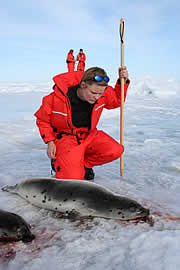At long last last: ban on seal fur imports comes after unnecessary delay
At long last last: ban on seal fur imports comes after unnecessary delay
SP Member of Parliament Krista van Velzen, recently named by animal welfare organisations in the Netherlands as "animal defender of the year", says that she is "delighted" by Agriculture Minister Cees Veerman's decision to ban the import of seal fur and other seal products. “Almost two years ago I proposed a motion asking for such a ban," Ms Van Velzen said. "Unfortunately both the VVD (right-wing Liberals) and PvdA (Labour) voted against, on purely technical grounds. This was politics with a small 'p' indeed, but as a result we've had to wait two years for a ban to be effected, which leaves me with a bad taste in my mouth.”
 Van Velzen's hope is that the ban will be unlimited in scope, and not, as Labour and the VVD argue that it should be, applied only to hooded seals and harp seals from Canada. All products of each and every species of seal from whatever source should be covered, she argues, citing an example from Namibia where the animals are "hunted using precisely the same cruel methods. Their pelts are also exported to Europe and there's no reason at all not to include them in an immediate ban.”
Van Velzen's hope is that the ban will be unlimited in scope, and not, as Labour and the VVD argue that it should be, applied only to hooded seals and harp seals from Canada. All products of each and every species of seal from whatever source should be covered, she argues, citing an example from Namibia where the animals are "hunted using precisely the same cruel methods. Their pelts are also exported to Europe and there's no reason at all not to include them in an immediate ban.”
In the last few years the import into the Netherlands of oil from seal blubber has increased enormously. In 2001 the total value of such imports was 74,451 euros. This had grown to 521,060 euros by 2004 and in 2005 topped 725,000 euros.
And it is not only the Netherlands which participates in this cruel trade. The European Union as a whole has seen an explosive growth in trade in seal fur, with around 50,000 pelts, valued at 1.6 million euros, imported from Canada alone into the EU in 2003, and more from Russia, Greenland and Norway. The SP will therefore be fighting hard to see the ban imposed, with no exemptions, at European level.
